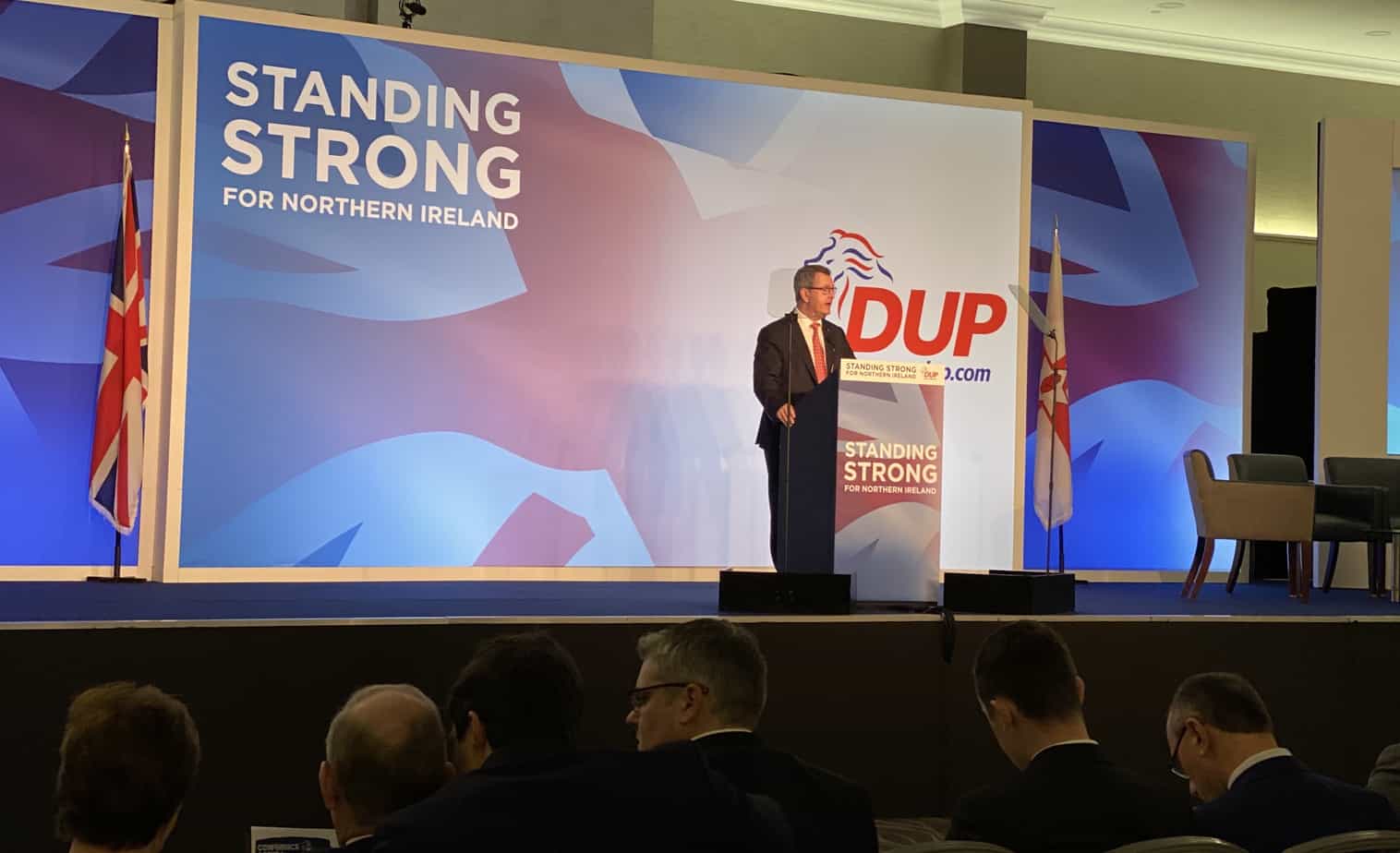Jeffrey Donaldson has been getting a bad press for what seems like his eternal dithering over devolution and failure to move the process forward. It is said that the party officers are split and that he can’t carry his Executive with him. Even if he does succeed in persuading a narrow majority to support his deal there is a risk of a hugely damaging party split with the anti-Protocol or Windsor Framework faction defecting to the TUV or some other new party.
There is, of course, a delicious irony in all of this: Donaldson left Trimble high and dry in the GFA negotiations. He then left the UUP and helped to precipitate its decline and replacement by the DUP as the top dog in unionism. The GFA may have delivered 25 years of relative peace, but it also ended unionist hegemony and all but destroyed the UUP. In the same vein, the Windsor Framework may contribute to economic growth in Northern Ireland, but it will be mostly in response to improved trade with Ireland and the EU rather than with Britain.
In trading economics, proximity is still king, and particularly now with supply chain issues in the Red Sea. It made absolutely no economic sense for the UK to leave its closest trading partners in the Single Market in favour of closer ties with antipodean countries and the Pacific rim. Even the much vaunted and wished for trade deal with the USA is small beer in comparison to trade within Europe. It is therefore no surprise that while trade within Ireland has grown hugely, UK EU trade has declined.
You may as well blame the law of gravity for this, it is not going to change.
Exports from Northern Ireland to the south have increased by 61% while imports from the south have increased by 47%. Meanwhile Exports for the UK to the EU have declined by 16%, while imports have declined by 20% and may decline further as UK import controls are introduced, with increased paperwork from February and physical checks from November of this year.
The latest figures for Northern Ireland show exports to Great Britain also increased by 13% (2021 vs. 2020) while imports increased by 7.6%, So there is no evidence, as of yet, that the increase in trade within Ireland has been at the expense of Great Britain, although the impact of the Windsor framework will only start showing up in future trading volumes.
Overall, Northern Ireland economy is doing much better than the rest of the UK particularly where trade in goods is concerned. But from a DUP point of view, that is not the point. Anything which smacks of greater north south economic trade is seen by them as a slippery slope to greater political cooperation as well.
UK MPs have expressed concern about the surge in North south trade, and there are rumours that the DUP UK government talks have included discussions about disrupting the increase in north south trade. For the DUP, the Union is more important than economic development. If confirmed, I’m sure Sinn Féin and the Irish government might have something to say about that!
But the relatively good performance of the Northern Ireland private sector is also shielding the DUP from the fallout of British government cuts in public expenditure. So far, the Northern Ireland economy, taken as a whole, is still doing relatively well, compared to Britain as a whole. Unemployment is at a record 2.1% low and most people in the private sector have yet to experience a serious downturn in their job security and living standards.
This may be partly why the DUP is not experiencing any significant electoral fall-out from their boycott of the GFA institutions. The DUP’s share of the total vote has increased from 21% in the 2022 Assembly elections, to 23% in the 2023 Local elections, and currently stands at 28% in the latest LucidTalk poll – almost within the margin of error of Sinn Féin’s 31%. What’s not to like if you are the DUP leader? Yes, many people are being effected by public service cutbacks, but show me the evidence that this is eating into DUP support!
The Secretary of State’s threat to call renewed elections if the GFA institutions are not revived is an empty threat if the DUP stands to gain some seats, even if it is at the expense of the UUP and TUV. With Alliance also polling well, the SDLP may well slip below the threshold for seats in some constituencies, raising the possibility of some slippage in nationalist seat numbers.
So why should Jeffrey Donaldson put this potential electoral progress at risk by provoking a damaging split between the pro and anti-devolution camps within his party? A deal which does not meet the DUP’s 7 tests risks provoking some members to stand for the TUV or some new start-up party putting DUP seats at risk and banishing all hope of ever overtaking Sinn Féin for the First Ministership again.
Yes, there has been a secular decline in the total unionist vote for many years now, but there is no evidence this has accelerated in recent times due to the boycott. Donaldson can claim that this is due to dis-unity within the unionist camp and call on all unionists to unite behind the DUP. Provided he does not split his own party, he is sitting pretty right now. The wider problems of unionism and of the public sector workers, in particular, are not his immediate problem. Party unity is. In the long term, we are all dead.
The blame for public sector cutbacks can always be put at the Secretary of State’s door and the hope is they might be reversed by a Labour government in any case. Perhaps if sufficient pressure can be put on Chris Heaton-Harris, even he can be persuaded to change his mind. There has never been a threat or deadline issued by him that he has ever followed through on. Hang in there and sit tight may well be the best strategy the DUP can muster in its own interest. Blaming others for all ills has long been the DUP practice anyway.
Non DUP unionist voters, bitter at the imposition of Brexit against their wishes and who consider the border down the Irish sea to be all the DUP’s fault, can fulminate all they want. They were never going to vote for the DUP anyway. Nationalists and non-aligned voters can complain all they want, but Donaldson isn’t looking for their votes. This is a game of chicken where the most steadfast will win, and their calculation may be that Chris Heaton-Harris will not want to leave chaos in Northern Ireland as his legacy. The money is sitting in his bank account, waiting to be spent.
The only thing that might change Donaldson’s mind is if the DUP polling numbers were to decline drastically, and there is no sign of that happening. Nobody ever accused hard line unionists of not being steadfast in their beliefs. As long as his voting base remains solid, Donaldson has no incentive to restore devolution at the risk of splitting his party. As Churchill might have said: he is engaging in masterly inactivity while watching his poll numbers rise.
In the meantime, the DUP is the centre of all attention in the media and the sole party the British government seems to talk to. Slugger O’Toole has published many articles by unionists critical of Donaldson’s stance, with most predicting an imminent return to devolution. But Donaldson will be mindful of the fate of every unionist leader who made a compromise for the sake of power. He will not let others do onto him, what he did to Trimble.
There is an old maxim in politics that “there is no such thing as bad publicity.” While the DUP is the centre of attention, every other party is paralysed and in the doldrums. No special talks with the British government for them. No constant media attention or special features on their key players. Some minor DUP officials have never had it so good, with everyone speculating on their next move.
The longer this pantomime can be made run, the better for their prospects. Their name recognition with the public is soaring. Old war horses on the way out are having another innings, appearing at parliamentary hearings, and having their every utterance treated with due reverence. Nonentities who have never been elected to anything hold centre stage. Unionists can feel they matter again, instead of being taken for granted within a power sharing arrangement.
Direct rule from London is not so bad a second option for unionists, especially if the alternative is being lorded over by a Sinn Féin First Minister. It matters not that Direct rule is not provided for in the GFA, if the objective is to undermine the GFA in the first place. Threats that the British government might give more influence to the Irish government through the Strand three institutions of the GFA are just that: threats that have never been implemented. British Irish inter-governmental relations have been so bad since Brexit, there is little fear of that happening anyway.
So even if you feel Northern Ireland is going to hell in a handcart, everything in the DUP world is going swimmingly. As long as they do nothing, they are the only people in Northern Ireland politics who appear to matter.
PS In his latest wheeze, Sunak has now offered the DUP what he wants to do anyway: retain the CE mark and avoid all divergence on standards with the EU. He has sought to placate the DUP with an undertaking to introduce a requirement that all new laws are screened to ensure they will not create extra trade barriers in the Irish Sea. All new legislation will have to be accompanied by a ministerial statement confirming it did not have a “significant adverse effect” on internal UK trade.
Hardliners in the Tory party are not impressed. Jacob Rees-Mogg, the former business secretary, has said: “This means we will not diverge at all, and we will have ended up with Theresa May’s Chequers deal in all but name. I voted against the Windsor Framework because it subordinates part of the UK to the EU. This mechanism would restore part of the EU hegemony over us.” Iain Duncan Smith, a former Tory leader, said the plan was “a real problem. The Windsor framework is the back door to the EU holding on to the UK and stopping us diverging. It should be replaced.”
Good luck with that. But for the DUP the effect on trade is secondary, as evidenced by their willingness to have a hard border within Ireland which would be far more disruptive of trade. It is the principle of a border in the Irish sea they object to. Sunak may only succeed in angering his right wing while achieving nothing with the DUP.
Frank Schnittger is the author of Sovereignty 2040, a future history of how Irish re-unification might work out. He has worked in business in Dublin and London and, on a voluntary basis, for charities in community development, education, restorative justice and addiction services.
Discover more from Slugger O'Toole
Subscribe to get the latest posts to your email.

